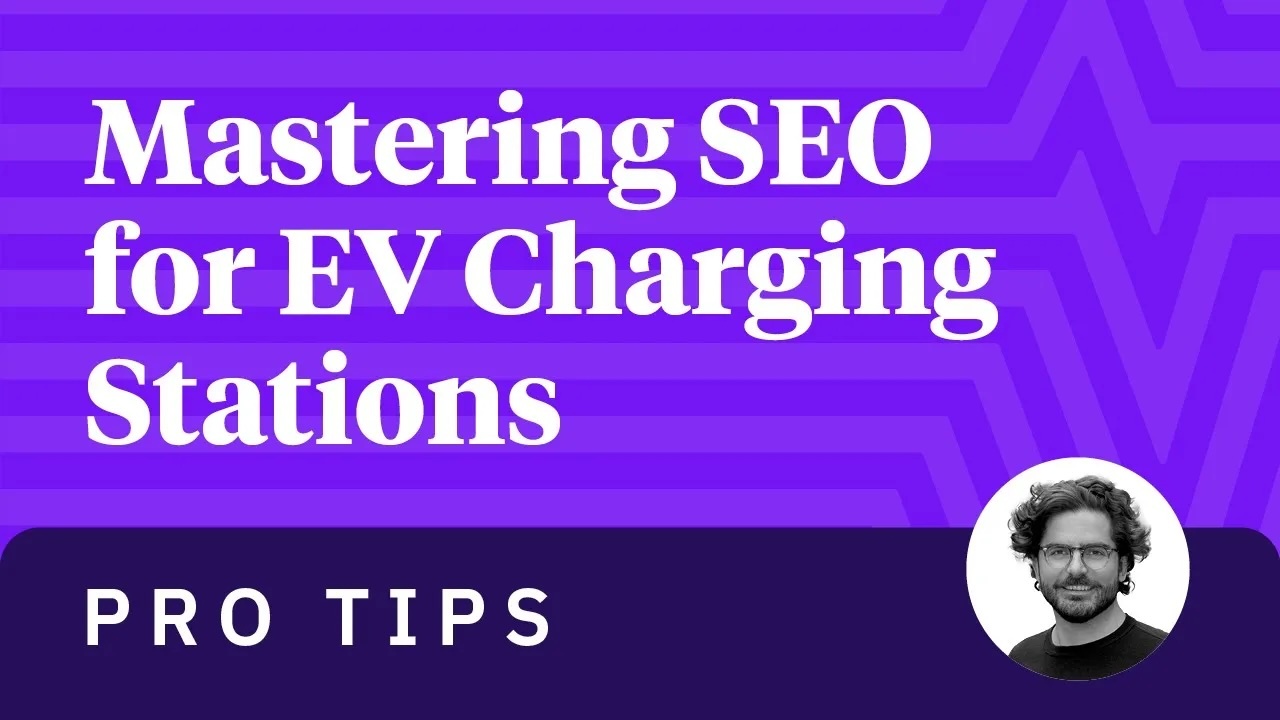
Navigating the Future of EV: A Comprehensive Guide to Strategic Location Marketing
The automotive industry is on the cusp of a transformative era, marked by the surge of electric vehicles (EVs) into mainstream consciousness.
As the world shifts towards cleaner mobility, the EV market is not only gaining momentum but also witnessing strategic collaborations, such as the integration of real-time battery range information by Google Maps. These developments underscore the dynamism of the EV market, making it a pivotal space for companies to position themselves strategically.
In this comprehensive guide, we explore how EV companies can solve for success through strategic location marketing. But first, we want to look at the past, present and future of EV.

From Niche to Necessity: A Century’s Evolution in Electric Vehicles
The roots of electric vehicles trace back over a hundred years into the late 19th century. Aperiod of nascent experimentation with alternative forms of transportation. However, it is only in recent years that we've witnessed a paradigm shift.
Advancements in battery technology have sparked a surge in affordability and an impressive improvement in range. As a result, EVs evolves from niche alternatives to worthy contenders in the automotive market.
In the current landscape, the electric vehicle market is experiencing a surge in mainstream acceptance, with major automakers unveiling a slew of new electric models and governments worldwide increasingly investing in EV infrastructure.
This trend is well-reflected in the growing number of charging points. By 2027 there are expected to be nearly three million charge points worldwide. Government incentives and regulations promoting sustainable mobility further contribute to the ongoing evolution.
As we peer into the future, the trajectory of EV development is poised to accelerate, backed by these advancements and a growing environmental consciousness. For EV companies—or companies that incorporate EVs into their product portfolio—this trajectory signals a strategic imperative:
align with the growing market
meet the rising consumer demand
capitalize on technological advancements
bp pulse empowers local teams for a stronger online impact to increase visibility
How Real Time Data Reshapes the EV Experience
The rising tide of EV adoption brings with it a need to address consumer concerns, particularly the infamous "range anxiety". To alleviate this fear, consumers demand real-time information on charging station locations and compatibility.
The more information drivers have on the charging station and its location, the higher their confidence will be that they can rely on it. Consequently, companies must refine processes, streamline listings, and incorporate automatic analytics to meet the dynamic demands of the digital-savvy consumer. Fortunately, search engines are also constantly evolving.
Google Maps and Real-Time Battery Range Information
The latest technological advancement in the EV landscape comes from Google Maps, which will now provide EV drivers with real-time battery range information, starting with Ford. This feature aims to alleviate one of the major concerns for EV drivers: range anxiety. The integration of real-time data into navigation tools is a significant step forward, allowing drivers to plan their routes more efficiently and confidently.

The Quest for Seamless EV Location Data Management
Despite the promising future of EV, companies grapple with challenges in location marketing that necessitate strategic solutions. As we delve into the intricate EV landscape, it becomes apparent that electric vehicle companies need tailored strategies to thrive in the competitive market.
Inefficient Data Management: Manual data management is resource-intensive, and inconsistencies in digital profiles across platforms pose a significant hurdle to online visibility.
Little Local Search Engine Optimization: A lack of local SEO and poorly optimized pages limit companies’ reach, leaving consumers unaware of—or unconvinced by—the respective product offer.
Uninformed Decision-Making: The lack of robust analytics hampers the ability to track and adjust campaigns, leading to diminished impact and effectiveness in marketing efforts.
Limited Claiming or Optimization of Entries: EV companies often face constraints in claiming or optimizing their business listings on various platforms, limiting their visibility and control.
Lack of Verified Company Information: The absence of verified business information can hinder customer trust and credibility.
Charge Point Operators (CPOs), on the other hand, struggle with:
Poor Data Quality: CPOs often face challenges with inaccurate or incomplete data, impacting the overall reliability of charging station information.
Missing Relevant Information: The absence of crucial details poses a hurdle for users seeking comprehensive information on charging stations.
Non-Human-Readable or Verifiable Data: Some data may not be easily interpreted by users or verified for accuracy, leading to potential user frustration and misinformation.
And these challenges are ultimately fueled by navigation platforms’ shortcomings:
Difficulty in Acquiring High-Quality Data: Navigation platforms encounter challenges in obtaining accurate and up-to-date data on charging station locations.
Non-Standardized Incoming Data Formats: The diverse formats in which data is received can pose difficulties in processing and presenting information uniformly.
Struggling to Align EV Data with Primary Business Profiles: Integrating EV-specific data with the primary business profile on navigation platforms can be challenging.
But we don't just talk about challenges; we're here to guide you through them with practical solutions that elevate your journey.
10 Local SEO Mistakes and How to Avoid Them
Key Goals and Strategies in Location Marketing for EV Companies
For EV companies, success lies in aligning their location marketing strategies with specific goals. This strategic alignment ensures that each aspect of their marketing endeavors contributes to a unified vision, promoting brand recognition, consumer trust, and a positive impact on the broader market.
Optimize Listings and Data Management
Efficient location data management is central to success. Streamlining listings, ensuring data accuracy across digital platforms, and implementing automated processes contribute significantly to optimizing efficiency, saving valuable time and resources.
Increase Website Clicks and Calls
Strategic SEO practices, compelling content, and user-friendly website design are pivotal for boosting online visibility and engagement. A seamless online experience encourages more clicks and calls, fostering greater customer interaction.
Increase ROI and Customer Lifetime Value
Maximizing ROI and customer lifetime value involves targeted marketing campaigns and data-driven decision-making. Personalized experiences and effective loyalty programs contribute to enhanced customer satisfaction and retention, vital for long-term business success.
Zooming Ahead Navigating the Future: Steering Toward Success
In a world where electric mobility is on the rise, smart and targeted location marketing is the key to success for EV companies. Establishing a robust online presence is critical for them to thrive—and so is leveraging the power of Local SEO and solidifying brand reputation.
Here's a comprehensive guide with actionable insights and strategies for businesses in the electric vehicle sector:
1. Mastering Local SEO: Elevate Your EV Business Listings
One of the cornerstones of a successful online presence is optimizing business listings for improved rankings. Ensure that your business information, including company name, address, and phone number (NAP) is accurate and consistent across platforms.
Claim and optimize your Google Business Profile (GBP) listing to appear prominently in local searches. Leverage relevant keywords in your business description, and encourage customers to leave positive reviews on GMB, as they play a crucial role in local search rankings.
Tailored Entries for Electric Vehicle Charging Stations
Entries for EV charging stations on platforms like Google resemble listings for nearby businesses, such as gas stations. However, they include specific information, making them prominently recommended in searches for EV charging stations.
These entries provide drivers with tailored details, allowing them to swiftly and easily identify the most suitable charging option for their needs and navigate to it. The specific information may encompass details like charging power, connector types, availability status, and user reviews, ensuring a comprehensive and user-friendly experience for individuals seeking efficient and convenient charging solutions for their electric vehicles.
2. Location-Based Marketing: Engage Your Audience Effectively
Craft targeted location-based marketing strategies to connect with your audience precisely where they are. Utilize geotargeting in your digital advertising to reach potential customers in specific locations.
Implement location-specific promotions or discounts to incentivize local EV enthusiasts. Consider partnerships with local businesses or events to increase your visibility within the community. For instance, offering exclusive charging station discounts in collaboration with nearby businesses can attract more users to your EV charging services.
Learn the secret of location driven growth
3. Brand Reputation Management: Harness the Power of Reviews
A stellar online reputation is paramount in the competitive EV market. Actively manage and respond to customer reviews across platforms, showcasing your commitment to customer satisfaction. Encourage satisfied customers to share their experiences through testimonials on your website or social media.
Address negative feedback promptly, demonstrating a proactive approach to problem-solving. Reviews not only enhance your reputation but also contribute to higher rankings in local search results.
4. Social Media Presence: Engage and Amplify
Develop a robust social media strategy to engage with your audience and amplify your brand. Regularly share content related to EV trends, sustainability, and user experiences. Showcase your charging stations, highlighting convenience, speed, and any unique features.
Run targeted and hyperlocal social media campaigns to promote events, discounts, or partnerships, further expanding your reach. Encourage user-generated content by organizing photo contests or sharing customer testimonials on social platforms.
5. Consistent Brand Messaging: Unify Your Online Presence
Maintain a consistent brand message across all digital channels. Ensure that your website, social media profiles, and business listings align with your brand identity. Consistency builds trust and recognition, contributing to a cohesive and memorable brand image. Regularly update your website with relevant and engaging content, incorporating keywords that resonate with your target audience.
A holistic approach to Local SEO, brand reputation management, and social media engagement creates a powerful synergy. By implementing these strategies, businesses in the electric vehicle industry can not only enhance their online presence but also establish themselves as leaders in the sustainable mobility space.
Revolutionizing EV Marketing: Synergistic Partnership for Unmatched Digital Presence
As the EV industry continues to surge forward, the demand for comprehensive solutions in multi location marketing becomes paramount. In this landscape, the dynamic partnership between Uberall and Eco-movement emerges as a game-changer, seamlessly integrating capabilities to offer a holistic solution for EV companies.
Eco-movement contributes static and dynamic EV data, encompassing critical information such as the number of charging devices as well as real-time charging station availability.
Uberall, on the other hand, enables CPOs to maintain a complete and accurate online business profile. As a charge point operator software at scale, it offers verified business data, ensuring primary and secondary data accuracy.
Together, Uberall—a leading location marketing platform—and Ecomovement empower EV companies with full visibility and control over their digital presence. The collaboration extends to advanced data processing, featuring functionalities like deduplication, data enrichment, and optimization for voice search. In this synergy, EV companies benefit from a holistic solution that combines accurate and dynamic charging station data with a rich and verified business profile, providing a powerful foundation for success in the rapidly evolving landscape of electric mobility.
Accelerate The Growth Of Your Charging Stations

